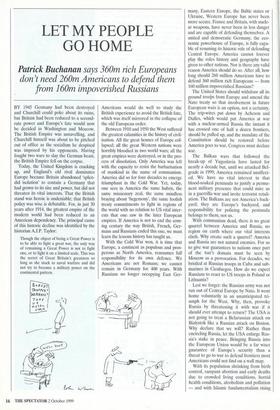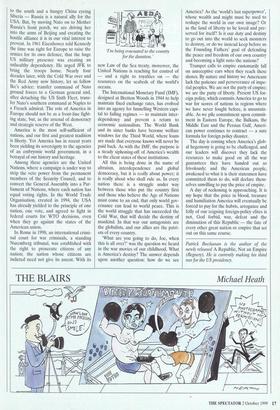LET MY PEOPLE GO HOME
Patrick Buchanan says 360m rich Europeans don't need 260m Americans to defend them from 160m impoverished Russians
BY 1945 Germany had been destroyed and Churchill could poke about its ruins, but Britain had been reduced to a second- rate power and Europe's fate would now be decided in Washington and Moscow. The British Empire was unravelling, and Churchill himself was about to be pitched out of office as the socialism he despised was imposed by his opponents. Having fought two wars to slay the German beast, the British Empire fell on the corpse.
Today, the United Kingdom is cracking up, and England's old rival dominates Europe because Britain abandoned 'splen- did isolation' to contain a Germany that had grown to its size and power, but did not threaten its vital interests. That the British stand was heroic is undeniable; that British policy was wise is debatable. For, in just 30 years after 1914, the greatest empire of the modem world had been reduced to an American dependency. The principal cause of this historic decline was identified by the historian A.J.P. Taylor:
Though the object of being a Great Power is to be able to fight a great war, the only way of remaining a Great Power is not to fight one, or to fight it on a limited scale. This WM the secret of Great Britain's greatness so long as she stuck to naval warfare and did not try to become a military power on the continental pattern.
Americans would do well to study the British experience to avoid the British fate, which was itself mirrored in the collapse of the old European order.
Between 1910 and 1950 the West suffered the greatest calamities in the history of civil- isation. All the great houses of Europe col- lapsed; all the great Western nations were horribly bloodied in two world wars; all the great empires were destroyed, or in the pro- cess of dissolution. Only America was left with the capacity to resist the barbarisation of mankind in the name of communism. America did so for four decades to emerge triumphant in the Cold War. Yet, today, one sees in America the same hubris, the same missionary zeal, the same mindless braying about `hegemony', the same foolish treaty commitments to fight in regions of the world with no relation to US vital inter- ests that one. saw in the later European empires. If America is not to end the com- ing century the way British, French, Ger- mans and Russians ended this one, we must learn the lessons history has taught us.
With the Cold War won, it is time that Europe, a continent as populous and pros- perous as North America, reassumes full responsibility for its own defence. We Americans are not Romans; we cannot remain in Germany for 400 years. With Russians no longer occupying East Ger- many, Eastern Europe, the Baltic states or Ukraine, Western Europe has never been more secure. France and Britain, with nucle- ar weapons, have never been in less danger and are capable of defending themselves. A united and democratic Germany, the eco- nomic powerhouse of Europe, is fully capa- ble of resuming its historic role of defending Central Europe. America cannot forever play the roles history and geography have given to other nations. Nor is there any valid reason America should do so. After all, how long should 260 million Americans have to defend 360 million rich Europeans — from 160 million impoverished Russians?
The United States should withdraw all its ground trootos from Europe and amend the Nato treaty so that involvement in future European wars is an option, not a certainty. The trip-wires put down by Acheson and Dulles, which would put America at war with a nuclear-anned Russia the instant it has crossed one of half a dozen frontiers, should be pulled up, and the mandate of the Constitution should be restored: before America goes to war, Congress must declare war.
The Balkan wars that followed the break-up of Yugoslavia have lasted for nearly a decade but, until we attacked Bel- grade in 1999, America remained unaffect- ed. We have no vital interest in that blood-soaked peninsula to justify a perma- nent military presence that could mire us in a guerrilla war and invite terrorist retali- ation. The Balkans are not America's back- yard; they are Europe's backyard, and responsibility for policing the peninsula belongs to them, not us.
With communism dead, there is no great quarrel between America and Russia, no region on earth where our vital interests clash. Why create such a quarrel? America and Russia are not natural enemies. For us to give war guarantees to nations once part of the tsar's domain must be seen by Moscow as a provocation. For decades, we bristled at Russian troops in Cuba and sub- marines in Cienfuegos. How do we expect Russians to react to US troops in Poland or Lithuania?
Lest we forget: the Russian army was not run out of Central Europe by Nato. It went home voluntarily in an unanticipated tri- umph for the West. Why, then, provoke Russia by threatening it with war if it should ever attempt to return? The USA is not going to treat a Belarussian attack on Bialystok like a Russian attack on Boston. Why declare that we will? Rather than encircling Russia, let the USA enlarge Rus- sia's stake in peace. Bringing Russia into the European Union would be a far wiser guarantee of Europe's security than a threat to go to war to defend frontiers most Americans could not find on a wall map.
With its population shrinking from birth control, rampant abortion and early deaths due to crowded living conditions, horrid health conditions, alcoholism and pollution — and with Islamic fundamentalism rising to the south and a hungry China eyeing Siberia — Russia is a natural ally for the USA. But, by moving Nato on to Mother Russia's front porch, we are driving her into the arms of Beijing and creating the hostile alliance it is in our vital interest to prevent. In 1961 Eisenhower told Kennedy the time was right for Europe to raise the armies for its own defence, that the huge US military presence was creating an unhealthy dependency. He urged JFK to bring the troops home. Nearly four decades later, with the Cold War over and the Red Army now history, let us follow Ike's advice: transfer command of Nato ground forces to a German general and, after detaching the US Sixth Fleet, trans- fer Nato's southern command at Naples to a French admiral. The role of America in Europe should not be as a front-line fight- ing state, but, as the arsenal of democracy and strategic reserve of the West.
America is the most self-sufficient of nations, and our first and greatest tradition is liberty. Yet America has in recent years been yielding its sovereignty to the agencies of an embryonic world government, in a betrayal of our history and heritage.
Among these agencies are the United Nations, where a campaign is under way to strip the veto power from the permanent members of the Security Council, and to convert the General Assembly into a Par- liament of Nations, where each nation has equal voting rights. In the World Trade Organisation, created in 1994, the USA has already yielded to the principle of one nation, one vote, and agreed to fight in federal courts for WTO decisions, even when they go against the states of the American union.
In Rome in 1998, an international crimi- nal court for war criminals, a standing Nuremberg tribunal, was established with the right to prosecute citizens of any nation; the nation whose citizens are indicted need not give its assent. With its 'I'm being evacuated to the country for the duration.'
new Law of the Sea treaty, moreover, the United Nations is reaching for control of — and a right to royalties on — the resources on the seabeds of the world's oceans.
The International Monetary Fund (IMF), designed at Bretton Woods in 1944 to help maintain fixed exchange rates, has evolved into an agency for funnelling Western capi- tal to failing regimes — to maintain inter- dependency and prevent a return to economic nationalism. The World Bank and its sister banks have become welfare windows for the Third World, where loans are made that everyone knows will never be paid back. As with the IMF, the purpose is a steady siphoning-off of America's wealth to the client states of these institutions.
All this is being done in the name of altruism, interdependence and global democracy, but it is really about power; it is really about who shall rule us. In every nation there is a struggle under way between those who put the country first and those who believe the Age of Nations must come to an end, that only world gov- ernance can lead to world peace. This is the world struggle that has succeeded the Cold War, that will decide the destiny of mankind. In that war our antagonists are the globalists, and our allies are the patri- ots of every country.
'What are you going to do, Joe, when this is all over?' was the question we heard in the war movies of our childhood. What is America's destiny? The answer depends upon another question: how do we see America? As the 'world's last superpower', whose wealth and might must be used to reshape the world in our own image? Or as the land of liberty to be loved and pre- served for itself? Is it our duty and destiny to go out into the world to seek monsters to destroy, or do we instead keep before us the Founding Fathers' goal of defending the peace and freedom of our own country and becoming a light unto the nations?
Trumpet calls to empire customarily fall on unreceptive ears when they reach these shores. By nature and history we Americans lack the patience and perseverance of impe- rial peoples. We are not the party of empire; we are the party of liberty. Present US for- eign policy, which commits America to go to war for scores of nations in regions where we have never fought before, is unsustain- able. As we pile commitment upon commit- ment in Eastern Europe, the Balkans, the Middle East and the Persian Gulf, Ameri- can power continues to contract — a sure formula for foreign policy disaster.
The day is coming when America's glob- al hegemony is going to be challenged, and our leaders will discover they lack the resources to make good on all the war guarantees they have handed out so frivolously; and the American people, awakened to what it is their statesmen have committed them to do, will declare them- selves unwilling to pay the price of empire.
A day of reckoning is approaching. It is my hope that the price in blood, treasure and humiliation America will eventually be forced to pay for the hubris, arrogance and folly of our reigning foreign-policy elites is not, God forbid, war, defeat and the diminution of this Republic — the fate of every other great nation or empire that set out on this same course.
Patrick Buchanan is the author of the newly released A Republic, Not an Empire (Regnery). He is currently making his third run for the US presidency.











































































 Previous page
Previous page